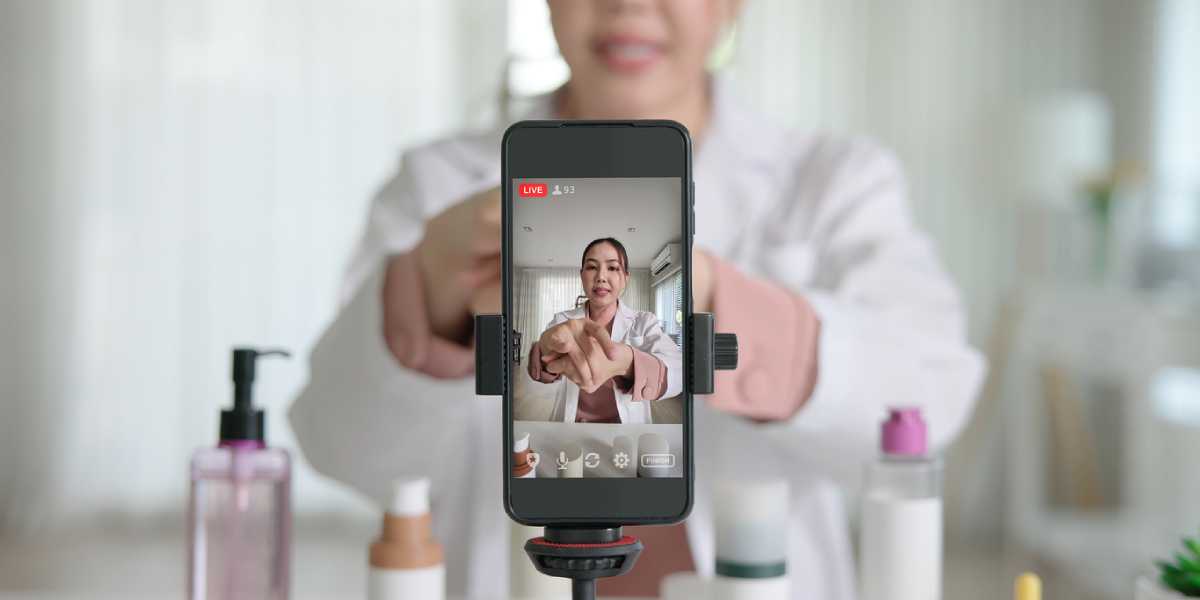Published Nov 13, 2025 | 2:06 PM ⚊ Updated Nov 13, 2025 | 6:00 PM

Synopsis: From beauty products to baby food to even underwear, doctors are endorsing various products in violation of medical ethics. And they are paid handsomely. However, the extent to which they go to become famous on social media is alarming.
It is shocking, but true — and it’s all about making a quick buck and fame!
A panel discussion at the second edition of South First’s Dakshin Health Summit revealed that some young dermatologists are earning between ₹10 lakh and ₹30 lakh a month through paid brand collaborations on social media!
This practice violates medical ethics, prompting professional bodies to initiate regulatory action.
During the panel discussion on ‘Social Media and Skin & Hair Health’ held at the Asian Institute of Gastroenterology (AIG), Gachibowli, on Sunday, 9 November, Dr Rajetha Damisetty, Senior Dermatologist, Founder–Director of Mohana Skin, Hair & Aesthetic Clinic, and Organising Chairperson of Dakshin Health Summit, revealed the scale of the problem and the steps being initiated to address it.
“What we did this year at IADVL (the Indian Association of Dermatologists, Venereologists and Leprologists)’s Anti-Quackery, Legal and Ethics Committee was to address the emerging issue: the growing trend of young dermatologists being influenced to take the social media route for fame,” Dr Damisetty, who chairs the committee, said.
“When I was a newly minted MD, I wanted to become like Dr Maya or Dr Malavika—to learn, to grow, to give talks, and build credibility through work. But now, many young dermatologists don’t want to become like us. They want followers, likes, and brand endorsements,” she added, shedding light on the influence of social media.
Dr Damisetty revealed the financial incentives driving unethical behaviour: “We have authentic information that some dermatologists are making ₹10 to ₹30 lakh a month just through paid collaborations. But this is a bubble that’s going to burst. Once these influencers start demanding such high payments, companies will look for someone younger, perhaps more photogenic, or willing to push boundaries further.”

The second edition of the Dakshin Health Summit 2025 was held at the Asian Institute of Gastroenterology in Hyderabad on Sunday, 9 November.
The pursuit of social media fame has led to increasingly problematic content. “These are doctors—our colleagues—and are supposed to have ethical limits. But where do we draw the line? There’s even a paper on the sexualisation of doctors on Instagram. It’s concerning,” Dr Damisetty further said.
She described encountering shocking content: “I recently came across a dermatologist’s video about shampoos—the thumbnail was shocking. I wouldn’t dare put up something like that one. I don’t even want to be seen in the same frame as such content. The problem is, some are willing to post anything for visibility.”
Dr Damisetty explained the broader consequences: “But dermatologists can’t win this game—we are too few, and the moment a few of us cross ethical lines, it affects the credibility of the entire fraternity. There will always be a small minority willing to risk their medical licences for influencer fame. If we, as a community, don’t take a collective stand against such unethical practices, it will only worsen.”
The IADVL committee has begun to crack the whip. “So, here’s what we did through our committee this year: we issued notices to several such individuals. A few responded, a few didn’t—those who failed to reply properly were escalated to their respective medical councils. We already have a case under review in the Karnataka Medical Council, and recently, we received a notice from the Delhi Medical Council asking us to resubmit detailed evidence.”
Dr Damisetty noted regional variations: “This action has already begun. Fortunately, I’m proud to say that in Telangana, we haven’t encountered such cases so far—at least none that we’ve documented.”
Dr Avinash Pravin, Consultant Dermatologist at Pravin Skin Clinic, Nagercoil, revealed the mechanics of brand endorsements.
“For every company today, having a dermatologist promote something gives them extra mileage. Even though I’m constantly exposing quacks and calling out unethical practices, my inbox is full of promotional offers—from shilajit to whey protein! look at my body, can I promote whey protein! They want visibility, not credibility,” he said.
He highlighted the absurdity: “The irony is, doctors cannot legally endorse medicines—but what about clothing brands, gym supplements, or grooming products? I’ve even seen an orthopaedic doctor endorsing underwear!”
Dr Pravin exposed how companies avoid direct accountability: “These companies are paying influencers and doctors without transparency. The middle agencies reach out to multiple doctors, not the brands directly. They just say, ‘Accept the terms and conditions,’ without telling you what the actual product is. You might end up promoting anything—a fan, a light, or a supplement—only after accepting the conditions that you find out what it’s all about. And these are very popular brands!”
Dr Sivaranjani Santosh, Senior Paediatrician, First Aid Trainer, and Social Activist from Hyderabad, shared her experience with persistent brand approaches.
“I’ve written multiple times to them about paediatricians endorsing baby food products. Those doctors ended up blocking me on social media—and, of course, I was labelled ‘jealous,’ which is the standard response when you question such practices,” she said.
Dr Santosh described the indiscriminate nature of brand outreach: “I sent the NMC proof of these endorsements, along with my earlier complaints about ORS promotions. I even wrote to the Central Health Ministry. But guess what—just a few days ago, a baby food brand itself reached out to me for an endorsement! I couldn’t stop laughing. I didn’t even respond to the message. Clearly, they don’t do any research; they just approach whoever is popular on social media.”
Dr Santosh revealed the pressure she now faces: “Nowadays I’m actually scared. I get invited to so many forums, and the first thing I ask is whether there’s any sponsorship from a milk formula company. The radar is on me now—even a small ethical mistake, even if unintentional, will be blown out of proportion. So I have to be extra cautious.”
Dr Pravin called for regulatory modernisation: “We need the National Medical Commission (NMC) to step in and update the regulations. The 2002 guidelines are outdated for today’s digital era. Right now, NMC says doctors shouldn’t endorse products—but in reality, many doctors are doing it openly and becoming Instagram celebrities. Meanwhile, doctors who post genuine awareness videos hardly get any reach.”
He noted the irony: “It’s strange—I recently saw a reel where a doctor was saying, ‘Endorsements are illegal.’ The next day, 100 other doctors made similar videos—some even doing paid promotions alongside it!”
Dr Pravin emphasised the gap between old rules and new reality: “The 2002 ethics framework was written in a time when doctors weren’t even on social media. But now, social media is the new public square for healthcare. And yes, when someone argues, ‘But you’re also on social media, doctor,’ I tell them—yes, but there’s a difference between education and endorsement.”
Dr Damisetty concluded with advice for the medical community: “There are so many dermatologists promoting brands on social media, trying to ride the gravy train by tagging whoever is trending. If someone becomes popular for any reason, suddenly, everyone wants to collaborate. We always insist that any partnership or collaboration should go through our team, through people who are technically qualified and ethical. Only then can we ensure credibility.”
(Edited by Majnu Babu).

